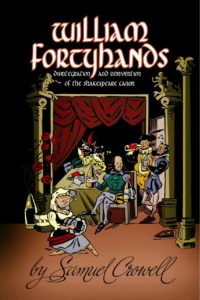Who wrote the plays and poems attributed to William Shakespeare?” This
simple yet provocative question has long bedeviled Shakespearean studies.
According to traditional scholars, the canonical texts can only trace to
the singular genius of a glover’s son from the small town of Stratford on
Avon. But dissident voices have disrupted this consensus for more than 150
years, and while skeptics who engage the “authorship question” have often
been dismissed as marginal cranks or elitists (or, in contemporary
parlance, as “deniers”), their ranks have included such luminaries as Mark
Twain, Henry James, and Sigmund Freud—as well as such acclaimed
Shakespearean actors as Derek Jacobi and Mark Rylance.
The counterweight to the claim that “Shakespeare wrote Shakespeare”
typically hinges on the promotion of a single alternate candidate. Popular
contenders have included Francis Bacon, Christopher Marlowe, and more
recently, Edward de Vere, the 17th Earl of Oxford. In Willam Fortyhands,
Samuel Crowell argues that this is the wrong way to approach the problem.
The real problem, according to Crowell, rests in our fundamental
perspective on the First Folio—the inaugural collection of Shakespeare
published seven years after his death. Drawing on the history of
Shakespearean scholarship, literary criticism, philosophy, and even science
fiction, William Fortyhands seeks to show not only how our understanding
of Shakespeare has been distorted, but how analytical tendencies have
allowed the plays to be parceled out to other authors, only to find
Shakespeare’s hand, even today, throughout Elizabethan literature.
William Fortyhands is also a memorial—without a tomb—for Shakespeare’s
many gifted and highly educated peers, whose contributions have been
scanted in favor of simplistic narratives pitting Shakespeare against some
single rival claimant. Among those profiled are the prolific bohemian Robert
Greene, the brilliant satirist Thomas Nashe, the learned sailor and
doctor Thomas Lodge, the outrageous and supremely poetic Christopher
Marlowe, the whimsical and humane Thomas Dekker, the encyclopedic Michael
Drayton, and the earnest historian Samuel Daniel.
William Fortyhands throws a light on the creative efflorescence that was
Elizabeth’s London—but from which only one name has emerged.
